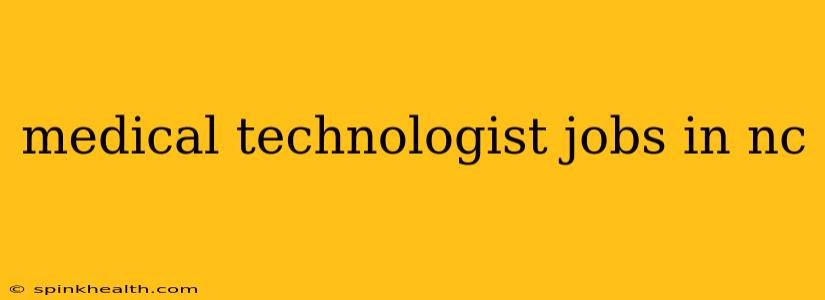The vibrant healthcare landscape of North Carolina offers a wealth of opportunities for medical technologists, professionals vital to accurate diagnoses and effective patient care. If you're a skilled medical technologist seeking a career in the Tar Heel State, or perhaps you're considering this rewarding career path, this guide will illuminate the landscape of medical technologist jobs in NC.
My journey into the world of medical technology began with a fascination for the unseen—the microscopic world that holds the key to understanding human health. The precision, the problem-solving, the direct impact on patient lives...it all captivated me. And after years in the field, I can tell you firsthand the immense satisfaction a medical technologist finds in their work. This post is born from that experience, aimed at guiding you through the possibilities of a career as a medical technologist in North Carolina.
What Does a Medical Technologist Do?
Before diving into job opportunities, let's clarify the role. Medical technologists, also known as clinical laboratory scientists, are the unsung heroes of the healthcare system. They analyze body fluids, tissues, and other specimens to provide crucial diagnostic information to physicians. Think of it like this: they are the detectives, meticulously examining the clues (samples) to help solve the case (diagnose the illness). Their work involves a wide range of techniques and technologies, including:
- Hematology: Analyzing blood cells to diagnose conditions like anemia and leukemia.
- Clinical Chemistry: Measuring levels of various substances in blood and other fluids to detect organ dysfunction and metabolic disorders.
- Microbiology: Identifying bacteria, viruses, fungi, and parasites, guiding antibiotic treatment and infection control.
- Immunology and Serology: Analyzing immune system components to diagnose infectious diseases and autoimmune disorders.
- Blood Banking (Transfusion Medicine): Ensuring safe blood transfusions through careful testing and compatibility analysis.
This is not simply a routine job; it's a constant challenge, requiring sharp analytical skills and attention to detail. Every test result holds significant weight, directly impacting patient care and treatment decisions.
What are the Job Prospects for Medical Technologists in NC?
North Carolina's growing population and its expanding healthcare infrastructure have created a significant demand for skilled medical technologists. Hospitals, clinical laboratories, and diagnostic centers throughout the state are actively seeking qualified professionals. The job market is competitive, but the demand remains strong, especially for those with advanced certifications and specialized skills.
Where are the best places to find medical technologist jobs in NC?
Major cities like Charlotte, Raleigh, Durham, and Greensboro boast a large number of hospitals and medical facilities, making them hotspots for medical technologist positions. However, opportunities exist across the state in both urban and rural areas.
How Much Do Medical Technologists in NC Make?
Salaries for medical technologists in North Carolina vary depending on experience, education, location, and employer. However, you can expect a competitive salary reflecting the crucial role you play in healthcare. More experienced technologists with specialized certifications tend to command higher salaries. Online salary aggregators can provide a more precise estimate based on your specific situation.
What Education and Certifications are Needed to Become a Medical Technologist in NC?
To become a medical technologist in NC, you typically need a bachelor's degree in medical technology, clinical laboratory science, or a closely related field from an accredited program. Many professionals go on to obtain ASCP certification (American Society for Clinical Pathology), which further enhances job prospects and earning potential. This certification demonstrates competency and adherence to professional standards.
What are the Different Types of Medical Technologist Jobs in NC?
The diverse healthcare landscape of NC offers various specialization opportunities for medical technologists. This includes:
- Hospital Laboratory Technologist: Working directly within a hospital's laboratory, providing rapid turnaround of crucial diagnostic tests.
- Reference Laboratory Technologist: Working in a large independent laboratory, processing specimens from various healthcare facilities.
- Research Laboratory Technologist: Using laboratory skills within a research setting, contributing to scientific advancements in medical technology.
How can I find Medical Technologist jobs in NC?
Several resources can assist in your job search:
- Online Job Boards: Indeed, Monster, LinkedIn, and others regularly post medical technologist openings.
- Hospital and Laboratory Websites: Check the career pages of hospitals and independent laboratories in NC.
- Professional Organizations: Networking with professional organizations like the ASCP can lead to valuable job leads.
- Recruitment Agencies: Medical recruitment agencies specialize in placing medical professionals and can provide assistance.
In closing, a career as a medical technologist in North Carolina presents a rewarding blend of intellectual challenge, hands-on work, and significant contributions to patient care. By leveraging the resources and insights provided here, you can embark on your journey towards a fulfilling career in this essential field.

